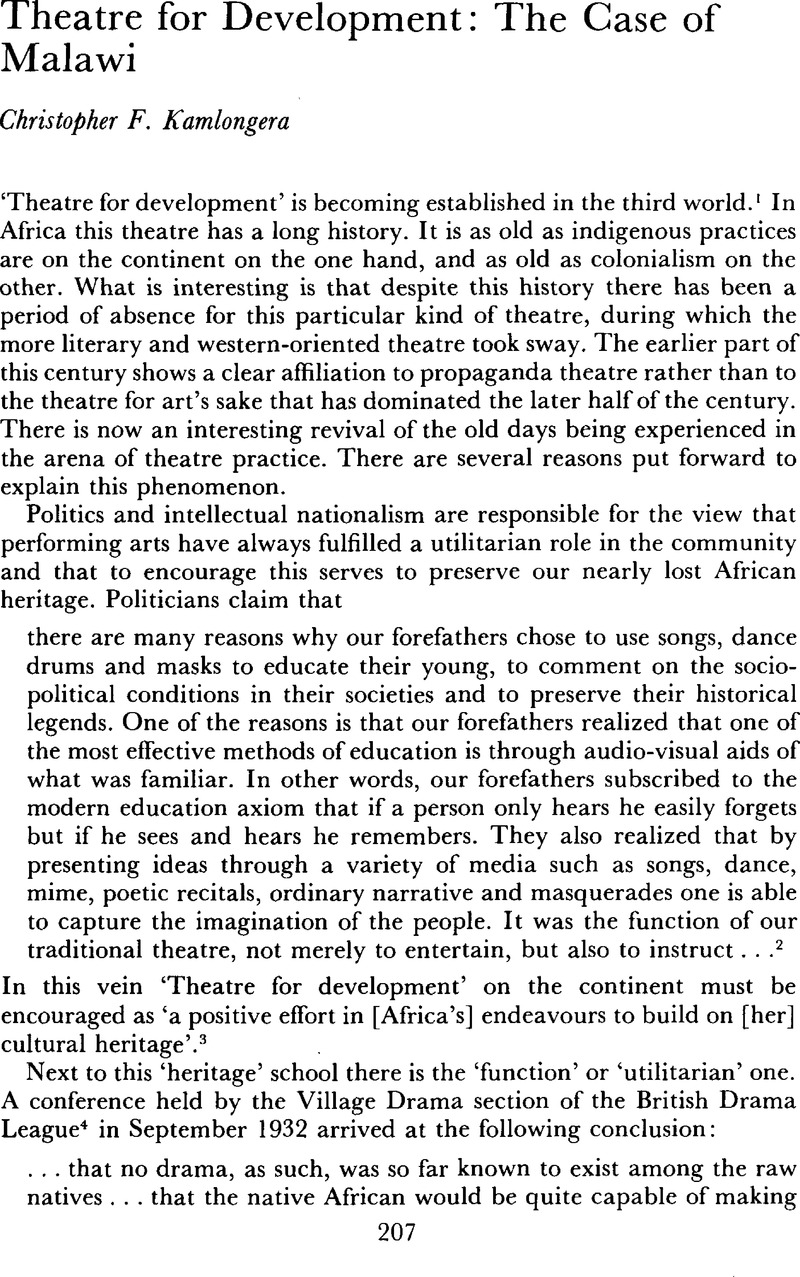Published online by Cambridge University Press: 23 January 2009

1. See Kidd, Ross, ‘Liberation or domestication? Popular theatre and non-formal education in Africa’, Educational Broadcasting International, 12 (03 1979), I, pp. 3–9.Google Scholar
2. E. H. K. Mudenda M.P. Chairman of the Social and Cultural Committee (Zambia) quoted in ‘Theatre for Development’, a report on a Regional Workshop held at Chalimbana, August 1979 prepared by Stephen Chifunyise, David Kerr and Frank Dall, pp. 4–7.
3. ibid.
4. As early as 1930 a Miss Margaret Cropper, a member of the Village Drama society visited Africa to mark the beginning of interest in evolving a drama for the natives. See Oversea Education, II (04 1931), 3, p. 112.Google Scholar
5. Report on ‘African Drama’, Oversea Education IV (04 1933), 3, pp. 160–1.Google Scholar
6. Jeans schools were government-run schools which placed emphasis on an education catering for the needs of rural agriculture. These were established all over the British protectorates.
7. Clarke, C. D., ‘Experiments in African Drama’, Oversea Education, IV (07 1935), 4, pp. 178–83.Google Scholar
8. For instance, Laedza Batanani in Botswana, Chikwakwa in Zambia and Wason Manoma in Zaria (Nigeria).
9. Kerr, David, ‘Didactic Theatre in Africa’, Harvard Educational Review, 51 (02 1981), I, pp. 145–55.CrossRefGoogle Scholar
10. Unesco, Support for the creative arts: Three examples of Canada, France and Spain, Cultural Development Documentary Dossier 15.
11. ibid, p. 5.
12. See Thiong'o, Ngugi wa, ‘Kenyan Culture: The National Struggle for Survival’, Writers in Politics, Heinemann, London, 1981, pp. 42–8.Google Scholar
13. See Kidd, , Byram, and Rohr-Rouendaal, , Laedza Batanani: Organizing Popular Theatre. The Laedza Batanani Experience, 1978. Institute of Adult Education, University of Botswana.Google Scholar
14. This is part of a German Technical Assistance Project aimed at opening several centres in the country.
15. Report on Mbalachanda Rural Growth Centre, Office of the President and Cabinet, Lilongwe, Malawi, 1978.
16. Timpunza-Mvula, E., The Lizard's Tail, 9 Malawian Plays ed. Gibbs, James, Popular publications, Malawi 1975.Google Scholar
17. Letter to The Promotion Officer (Small Scale Industries) Ref. No: Dev/21/IOC/15 from the Secretary, Office of the President and Cabinet, Lilongwe, Malawi.
18. See Szanto, G., Theatre and Propaganda, University of Texas Press, Austin, 1978.Google Scholar